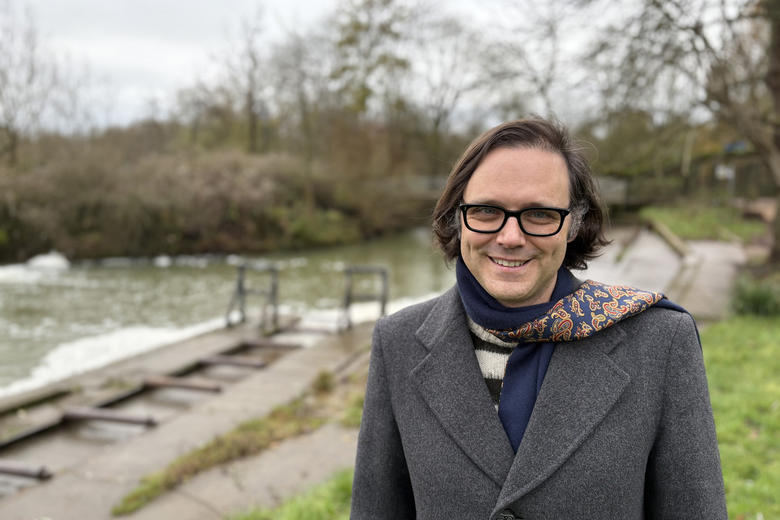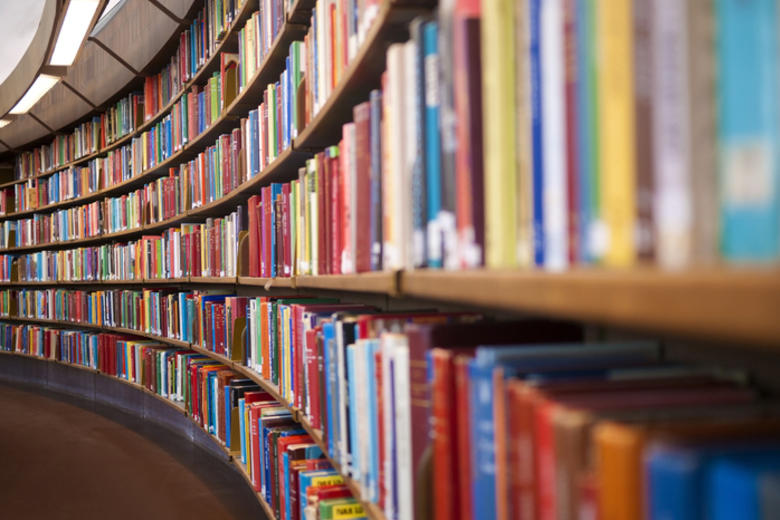ALUMNI STORIES: 'SOMETIMES IT'S THE SMALLER, QUIETER STORIES THAT CAN BE MOST POWERFUL'
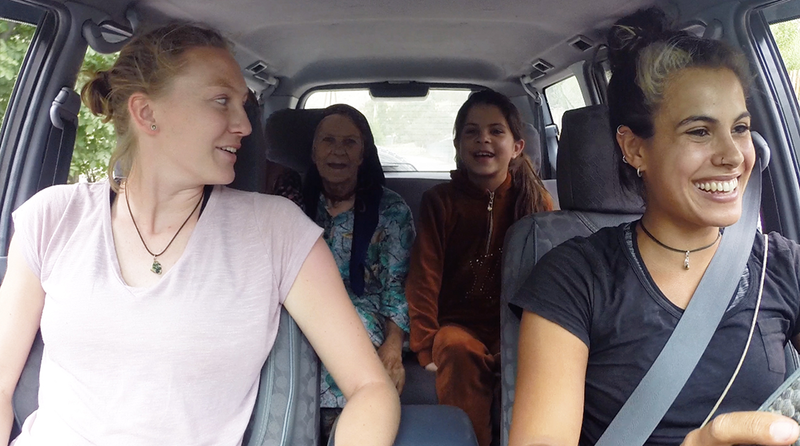
ALUMNI STORIES: 'SOMETIMES IT'S THE SMALLER, QUIETER STORIES THAT CAN BE MOST POWERFUL'
Filmmakers Cat Haigh (Keble, 2014) and Hannah Congdon (Pembroke, 2014) spoke to us about Women Behind the Wheel - a road trip documentary exploring women's issues in Central Asia, due for release in UK cinemas around International Women's Day.
Published: 28 February 2023
Share this article
Tell us about your time at Oxford and how you met?
Cat: Hannah and I met doing our undergraduate degrees at Oxford. I was at Keble doing human sciences and Hannah was at Pembroke studying English and we met each other on the lacrosse pitch in our first year. We were both on the University team, having played a lot at school and that's how we eventually got to know each other and became friends - and then started planning this trip in this film right towards the end of our final year.
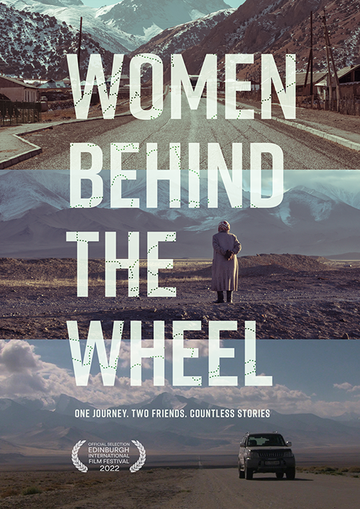
How did the idea for Women Behind the Wheel come about?
Cat: The idea for Women Behind the Wheel originally started when Hannah and I discovered we were both very curious about this region of the world: we wanted to visit Uzbekistan, Tajikistan and Kyrgyzstan - and these are not countries that people typically go to a visit on holiday. It was in doing more research that we came across interesting stories about women in the region and what they were doing to empower themselves. The region’s history is complex: these countries used to be part of the Soviet Union, and after that collapsed a large part of reclaiming national identity has been a reassertion of religious values and traditional cultural practices. The tension between some advances in women’s rights during the Soviet period, and more traditional national values that have re-emerged in the wake of independence, has had a real impact on women’s rights.
We then discovered the Pamir highway, which is the road we drive in the film. This road is the second highest international road on Earth, at its peak is around 5000m above sea level. So we kind of came up with this concept: why don't we get behind the wheel, get behind the camera - roles that are still typically done by males, even in our society - but use our journey as a vehicle to access women living in this part of the world, and hear their stories.
What was most challenging about the process - either in the planning and making of the film or the trip itself?
Cat: There's been a lot of challenges along the way.
Firstly in the planning of the film itself, for example it was complex for us to arrange the car hire: it’s not easy to hire a car in these countries, let alone to find a car that had the right papers to take it across the different borders. We did a lot of research in advance about border security, but there isn't a lot of information out there! So it was a bit of a gamble at times.
We then encountered a few challenges on the road, while we were filming. Obviously, the challenges related to the drive itself: the tyre punctures, wrong turns, the river that we can't cross. But I think at the start of the journey we also struggled a little bit to find women who were comfortable opening up in front of the camera. It’s really important to gain someone’s trust before holding a camera up to them. I think this is something that we got better at as the trip went on and actually, we came we ended up having wonderfully frank and open conversations with the women we met, often about difficult or intimate topics.
Then in terms of making the film: it's been in postproduction for nearly four years and in part it’s taken this long because we’ve not been working on it full-time, but also because funding has been a challenge. We have had to do three rounds of crowdfunding. We've had to apply to every single grant under the sun, and even then, we've still had to pause several times when the money had dried up and we couldn’t afford to pay our team. That has been one of the most challenging things we've had to overcome
And what was the most enjoyable?
Cat: I genuinely think one of the most enjoyable bits of this whole process is yet to come! It’s going to be amazing to finally see the film in cinemas filled with members of the public and watch other people's reaction to it. I'm really excited about that. Having premiered at Edinburgh International Film Festival, it is being released in UK cinemas around International Women's Day.
One incredible aspect of the film-making process for me was when the music (which was written for the film by our incredible composer Hollie Buhagiar) was finally layered on top of the footage - and it suddenly felt like a real film. It enhanced so many of the emotions in the film and brought the whole thing together beautifully. We hope our audiences enjoy the music in the film as much as we do, it’s a combination of compositions from Central Asian instruments mixed alongside more modern tracks and pop songs from the region.
Hannah: On the actual trip, some of the most joyful moments were outside of the filming process - spending time with the women we met, being brought into their lives for a short period of time. We were repeatedly struck by how generous and open with us these women were - we can’t count the number of times we were spontaneously invited to a sit-down meal or to stay overnight at a family home. Whilst it’s tricky to stay in touch with everyone because of varied internet access, it’s been lovely hearing the news over the years of lots of the women that feature in the film.
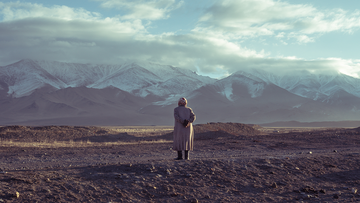
If you can choose just one each, which of the women you met inspired you the most?
Cat: I think a lady called Jamilya probably inspired me the most, you see her feature towards the end of the film. She lives in a town called Karakol in Kyrgyzstan, and she has set up a shelter for women who are victims of domestic abuse and is also running workshops to train the police on how to deal with these kind of circumstances, because a lot of times when women are the victims of domestic abuse they can't even go to the police because the police are not equipped or well trained on how to deal with these situations. Jamilya is an incredibly eloquent, warm lady, and had seen how her mother had suffered domestic abuse at the hands of her father, so eventually she wanted to do something in the local community.
Hannah: Hard to narrow it down, but one of the key takeaways from the film was how small changes at a local level can make a real difference. And I think one of the stories that exemplifies that is Dilbar - who is training women to become bee farmers in her remote town called Gharm. It might not get them much income, but even by earning just a small amount this shifted women’s positions in their marriages, families and communities.
How did the journey impact you both personally?
Cat: I think I found the journey very humbling. To be honest the hospitality that was shown to us was incredible, even in some of the most impoverished regions we visited (where people didn't have good infrastructure or enough fresh food), there was still an absolute willingness to accommodate us and that was very humbling. I hope it’s something people pick up on in the film: we’re moving into a scary place where people are increasingly xenophobic and fearful of foreigners and fearful of the ‘other’, and the attitude that was shown to us by the women in Central Asia was the complete opposite of that: it was warm, was welcoming, and that felt very special.
Hannah: It’s been a huge learning process, and the editing of the film really brought home the impact that it had on us. I think when we set out to make it, we slightly naively wanted to hear headline-grabbing stories about women taking on the patriarchy. Something we learned along the way, though, was that sometimes it’s the quieter, smaller stories that can be most powerful. Lots of the women in the film are grassroots local activists, making incremental changes in their local community that - collectively - can instigate real progress for women’s rights.
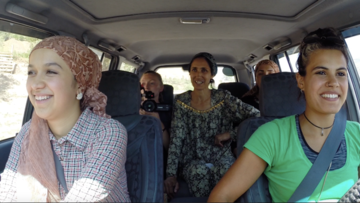
How did you get into filmmaking?
Cat: I would say that for me, I got into filmmaking through doing this film. For both of us, this film has been a passion project that we've done alongside working full-time jobs for the past four years, which has been a lot of work but it's very rewarding to see it finally paid off! In terms of my day-to-day job I actually work at L'Oreal and I'm a sales manager.
Hannah: My way in was a bit different - I’d actually always wanted to work in film, but had initially been more interested in fiction. My first job was working for the Berlinale straight after university, but it was making this documentary that made me realise docs were more my thing than fiction. Day to day I now work as a TV documentary producer.
Do you have any tips for aspiring filmmakers?
Cat: My first tip is going to sound very corny, but it's just don't give up. Making a film requires so much persistence. We've had to be hugely persistent in our efforts to get funding, in our efforts to get press to pay attention to the film - and eventually the persistence really pays off.
Another tip would be to find people that are passionate about the project themselves and get them to work with you, get them on board. Throughout this film we've had challenges with funding, we've never been able to pay our team what they truly deserve for the work that they've put in, but they all still delivered over and above, because they are passionate about the project and the women’s stories.
My final two tips related to filmmaking itself: when you are out on the shoot and interviewing people make sure you film as much B role as possible. Even if you think you're not going to need it, FILM IT. Get as much additional footage because it can really help build the picture of the scene.
Lastly, sound is really important. There's only so much cleaning of sound that you can do so really try and prioritise getting a clean sound recording. I have learned about the ways in which you can add sounds in to really enhance the emotions of certain scenes. I was also amazed by the way in which the music can completely transform a film.
And lastly, how has Oxford changed you?
Cat: Well, Oxford is obviously where Hannah and I met, and we have a huge number of shared, fond memories from our time studying in the city.
I think our degrees taught us how to work very efficiently. We've been juggling so many different aspects of the filmmaking process: from directing it, to producing it, to supervising the music, to trying to brief graphic designers, to pitching for funding - and I think Oxford really taught us how to multitask and how to handle so many different things at one go and not lose your head! So maybe it’s taught us how to stay calm in the face of an insurmountable task.
I think my degree in Human Sciences also gave me some experience in researching and interviewing women on fairly sensitive topics. In my final year I did my dissertation on Syrian refugees in Berlin and the subject of their fertility- it involved a month of qualitative research - so that taught me some skills in ethnographic research, and the importance understanding the cultural context behind everyone’s story.
We’re really excited that the film is going to be showing at the Ultimate Picture Palace cinema in Oxford (on 5 March). We are very proud of the fact that our film has given the opportunity for other young female creatives to work on the first feature film and would love the film to be an inspiration for other budding young filmmakers to pick up the camera, go out and pursue their ideas!
Watch Women Behind the Wheel trailer.
Book your place at Meeting Minds on Saturday 23 September to hear Cat Haigh talking about Documenting women’s stories in Central Asia.


